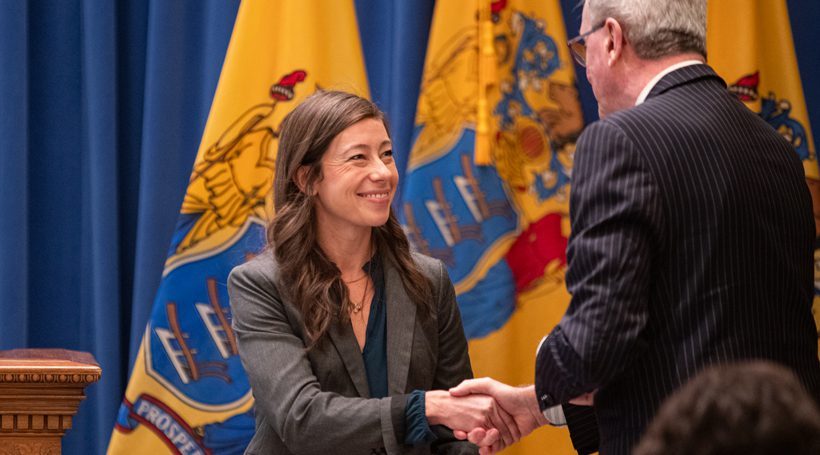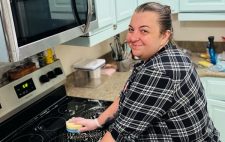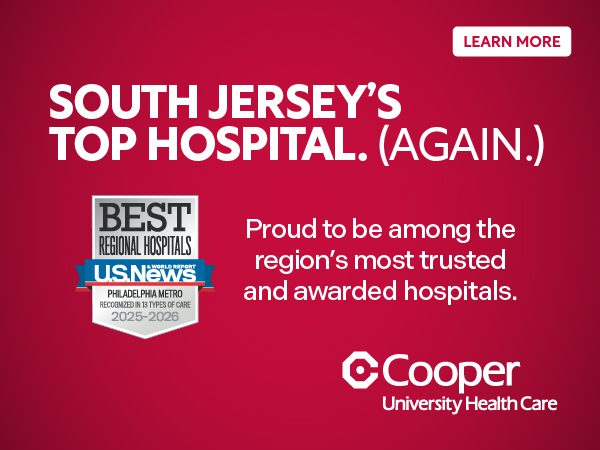In 2023, Kaitlan Baston, MD, left Cooper University Health Care to take on New Jersey’s top role for medical professionals – Health Commissioner. After spending nearly a decade at Cooper, where she launched the Addiction Medicine Program and helped create the Cooper Center for Healing, Baston has taken on everything from overseeing state health regulations and organizing women’s health initiatives to tackling the opioid crisis.
We caught up with the new commissioner to see how her first year has been, and to check in on some of the health department’s latest milestones.
Q: What was it like transitioning to commissioner?
This work aligns with exactly what I want to be doing for the rest of my life. I’m a primary care doc and an addiction doctor, so for my whole career, I’ve thought about the biopsychosocial model. And a lot of that is about what keeps people healthy, rather than just treating them when they’re sick. What kind of environments do people live in? How do they live? How do I empower people, and how do we do things in the background so people can take things like clean water for granted and focus on other things.
Q: Where did your interest in the biopsychosocial model come from?
My grandfather is a Holocaust survivor, and he spent his whole life on the Civil Rights movement, working on equity and saying, “We never want to see something like this happen again, and we need to take care of our neighbors.” It is ingrained in me, and I knew I wanted to work on equity in society. I found my way to healthcare through some global health initiatives, and it became apparent that we have unbelievable inequities here in the United States. 80% of your health outcomes have to do with your surroundings and your family. It’s something we don’t talk about enough. What’s one thing you wish people knew about the department?
I want people to know about the integrated license for healthcare professionals. Mental health, substance use disorder care, primary care and reproductive health – those are all basic primary care. We’re making it easier for people to find them in one place, so care surrounds the person, rather than making the person jump through hoops.
Q: How has your first year been?
It is the most gratifying job I’ve ever done. It’s probably also the hardest. When I started, my biggest priority was re-energizing the team after the pandemic and modernizing the department, looking at everything we can do to decrease busy work and make the department more efficient.
Q: What are some ways you re-energized your team?
We drew a giant mountain on a whiteboard on the wall outside my office with a quote that says, “To move a mountain, you move it one stone at a time.” Every time we have a single accomplishment in one of those big areas, we write it on the mountain. Sometimes all you can see is the mountain of work in front of you, but let’s stop and look at how far we’ve come.
Q: What team accomplishments are up there now?
One is a standing order for contraception, so anybody who wants birth control can get it at a pharmacy without needing a prescription. Also, harm reduction centers have been a huge focus of mine. When I started, there were seven. My base goal was to have at least one in every county, which would be 21. My top goal was to have a minimum of three different styles of harm reduction in every county: A standalone, which is a dependable, ideally brick-and-mortar center. Then, community-based harm reduction, which can be vending machines, community outreach workers or mobile units. And third is integrated harm reduction, which is integrated into healthcare so that it destigmatizes addiction and recovery. We’ve gone from seven to 50 approved harm reduction centers in the state. That’s probably my proudest accomplishment.
Q: What work have you done to combat addiction?
While we’ve started to see some decline in overdose deaths overall, it’s primarily in the white population and, unfortunately, the numbers in our black and brown populations are still going up. So we have adopted a platform in New Jersey called the Matters Platform. It’s an app that can connect the person in front of you to a telehealth visit if they need help. We’re in the process of building it in Camden City, which is one of the areas with the highest disparities in overdose deaths.
Q: How did South Jersey influence you when you worked here?
One of the things that was important for me to see was that residents in five of the southern counties – Atlantic, Camden, Cumberland, Gloucester and Salem – have consistently the shortest life expectancy and worst health outcomes in the state. And Salem and Cumberland consistently are the bottom two. Our two primarily southern, rural communities need a lot of resources to support them. It’s important for me to continue that lens and have some of that experience to help.













